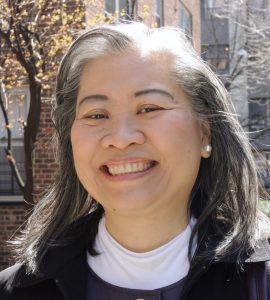by Gigie Sijera-Grant
As an Asian American, I find the news that the coronavirus pandemic is creating a rise in anti-Asian sentiment across the country disturbing and unacceptable. We all play a role in creating a safe public space if we see someone being harassed.
May is Asian Pacific American Heritage Month, so let’s focus on honoring and protecting people who have “both shaped the history of the United States and had their lives dramatically influenced by moments in its history.”
The ELCA has more than 100 Asian Lutheran ministries and 200 Asian pastors. How are these Asian Lutherans—our brothers and sisters–affected by the current trend of racism during this pandemic?
The Asian Pacific Policy & Planning Council (A3PCON) reports through its Stop AAPI Hate initiative that it’s received more than 1,500 reports of “verbal harassment, shunning, and physical assaults” against Asians since launching on March 19, 2020.
Asian in the ELCA includes Lutherans who are Chinese, Hmong, Indian/South Asian, Indonesian, Laotian, Japanese, Korean, Filipino, Thai. We also have a younger generation of Asians who can only speak English. And we have people of Asian descent who worship in white congregations.
Asian history of racism
Racism toward Asians has been around as far back as 1882. That’s when the U.S. government passed a law that banned Chinese laborers from entering the country because it feared they might take jobs away from the white Americans.
The anti-Chinese sentiment was so widespread that Chinese immigrants were afraid to leave their homes, thinking they would be assaulted or shot. Some were driven out of their homes, or their businesses were set on fire.
During World War II, Japanese Americans were put into concentration camps.
“Racism never disappears but adapts to new circumstances when old strains rise from the dark vaults of American history,” writes Cathy Park Hong in the New York Times Magazine.
Coronavirus shock

Lily Wu
My friend, Lily Wu, a Chinese American, lives in New York City, the epicenter of the coronavirus. As a former vice president of the Association of Asians and Pacific Islanders for the ELCA, she keeps close tabs on how Asians are affected during the pandemic.
“Coronavirus shock began for me on March 11 when I heard that a Korean American woman was punched in her face in midtown Manhattan,” Lily said.
Assaults against Asian Americans began surging in the U.S. and worldwide in March.
Wu said, “I’ve heard about verbal abuse, harassment, use of racial slurs, spitting, bullying, beatings, stabbings, even a woman suffering chemical burns on her face, neck, shoulders when a man threw acid at her. It’s more than shocking to me.
“My safety is at risk,” she added, “along with every Asian person who is targeted blame and punishment because of how we look.”
She reminds us that “just because we ‘look Chinese,’ we are not the virus. We are not the enemy. We’re Americans of Asian heritage from many different walks of life–including medical heroes, essential workers, and people of faith!”
What can you do?
What should you do if you witness racial discrimination against Asian Americans or any other person? Educate yourself using the following resources:
- Asian Americans Advancing Justice & the Hollaback organization has compiled resources in response to hate and racism directed toward Asian Americans related to the coronavirus or COVID-19. Find the resources here.
- Sign up for free one-hour training on how you can intervene. Several dates are available in May. You’ll learn five strategies for intervention when you see someone being harassed. You’ll also learn how to stay safe while intervening.
- Download a guide to learn how to better intervene if you see harassment. Learn more about the five Ds: distract, delegate, document, delay, and direct.
 The Rev. Gigie Sijera-Grant serves as president of the Association of Asians and Pacific Islanders-ELCA. She is now retired and lives in Columbia, Maryland, where she is raising her three grandchildren and engaging them with distance learning during the coronavirus pandemic lockdown. The feature photo is a watercolor from Pixaby in public domain.
The Rev. Gigie Sijera-Grant serves as president of the Association of Asians and Pacific Islanders-ELCA. She is now retired and lives in Columbia, Maryland, where she is raising her three grandchildren and engaging them with distance learning during the coronavirus pandemic lockdown. The feature photo is a watercolor from Pixaby in public domain.
